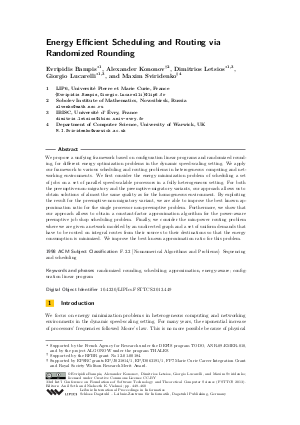Energy Efficient Scheduling and Routing via Randomized Rounding
Authors Evripidis Bampis, Alexander Kononov, Dimitrios Letsios, Giorgio Lucarelli, Maxim Sviridenko
-
Part of:
Volume:
IARCS Annual Conference on Foundations of Software Technology and Theoretical Computer Science (FSTTCS 2013)
Part of: Series: Leibniz International Proceedings in Informatics (LIPIcs)
Part of: Conference: IARCS Annual Conference on Foundations of Software Technology and Theoretical Computer Science (FSTTCS) - License:
 Creative Commons Attribution 3.0 Unported license
Creative Commons Attribution 3.0 Unported license
- Publication Date: 2013-12-10
File

PDF
LIPIcs.FSTTCS.2013.449.pdf
- Filesize: 443 kB
- 12 pages
Document Identifiers
Subject Classification
Keywords
- Randomized rounding; scheduling; approximation; energy-aware; configuration linear program
Metrics
- Access Statistics
-
Total Accesses (updated on a weekly basis)
0PDF Downloads0Metadata Views
Abstract
We propose a unifying framework based on configuration linear programs and randomized rounding, for different energy optimization problems in the dynamic speed-scaling setting. We apply our framework to various scheduling and routing problems in heterogeneous computing and networking environments. We first consider the energy minimization problem of scheduling a set of jobs on a set of parallel speed-scalable processors in a fully heterogeneous setting. For both the preemptive-non-migratory and the preemptive-migratory variants, our approach allows us to obtain solutions of almost the same quality as for the homogeneous environment. By exploiting the result for the preemptive-non-migratory variant, we are able to improve the best known approximation ratio for the single processor non-preemptive problem. Furthermore, we show that our approach allows to obtain a constant-factor approximation algorithm for the power-aware preemptive job shop scheduling problem. Finally, we consider the min-power routing problem where we are given a network modeled by an undirected graph and a set of uniform demands that have to be routed on integral routes from their sources to their destinations so that the energy consumption is minimized. We improve the best known approximation ratio for this problem.
Cite As Get BibTex
Evripidis Bampis, Alexander Kononov, Dimitrios Letsios, Giorgio Lucarelli, and Maxim Sviridenko. Energy Efficient Scheduling and Routing via Randomized Rounding. In IARCS Annual Conference on Foundations of Software Technology and Theoretical Computer Science (FSTTCS 2013). Leibniz International Proceedings in Informatics (LIPIcs), Volume 24, pp. 449-460, Schloss Dagstuhl – Leibniz-Zentrum für Informatik (2013)
https://doi.org/10.4230/LIPIcs.FSTTCS.2013.449
BibTex
@InProceedings{bampis_et_al:LIPIcs.FSTTCS.2013.449,
author = {Bampis, Evripidis and Kononov, Alexander and Letsios, Dimitrios and Lucarelli, Giorgio and Sviridenko, Maxim},
title = {{Energy Efficient Scheduling and Routing via Randomized Rounding}},
booktitle = {IARCS Annual Conference on Foundations of Software Technology and Theoretical Computer Science (FSTTCS 2013)},
pages = {449--460},
series = {Leibniz International Proceedings in Informatics (LIPIcs)},
ISBN = {978-3-939897-64-4},
ISSN = {1868-8969},
year = {2013},
volume = {24},
editor = {Seth, Anil and Vishnoi, Nisheeth K.},
publisher = {Schloss Dagstuhl -- Leibniz-Zentrum f{\"u}r Informatik},
address = {Dagstuhl, Germany},
URL = {https://drops.dagstuhl.de/entities/document/10.4230/LIPIcs.FSTTCS.2013.449},
URN = {urn:nbn:de:0030-drops-43923},
doi = {10.4230/LIPIcs.FSTTCS.2013.449},
annote = {Keywords: Randomized rounding; scheduling; approximation; energy-aware; configuration linear program}
}
